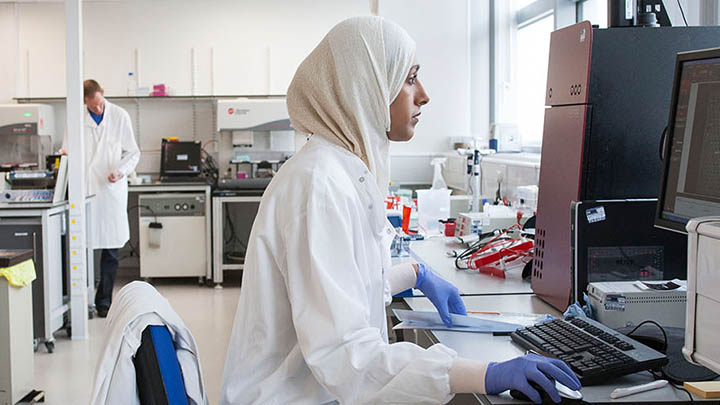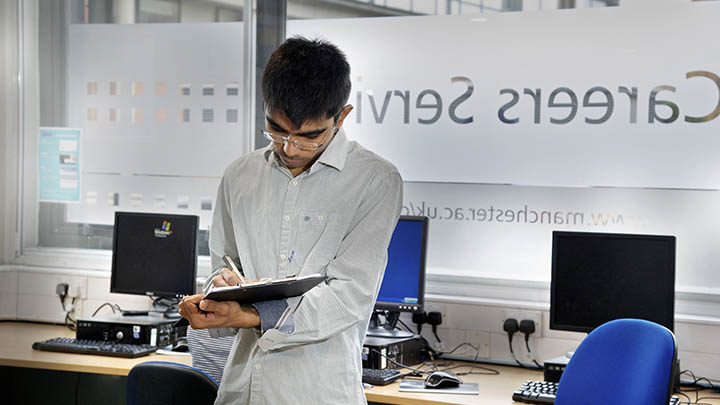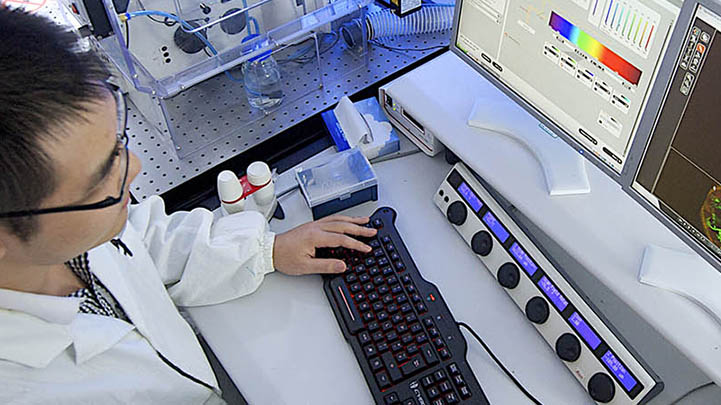Start your training on the MRC DTP
Why undertake a MRC DTP PhD?
The Medical Research Council (MRC) Doctoral Training Partnership (DTP) offers studentships for postgraduate researchers undertaking PhDs in biomedical, clinical and health services areas.
You'll have the opportunity to:
- Carry out a funded PhD project addressing some of the key priorities of the MRC.
- Learn how to fulfil unmet healthcare needs in the UK and globally.
- Enhance employability through training in cross-cutting skills such as informatics, in vivo and computation.
- Receive support in raising awareness of your research through external conferences, digital media and networking events.
- Develop interdisciplinary research skills by learning from biological, computational, material, physical, chemical and social scientists.
- Access competitive internal funding schemes for exceptional training opportunities, clinical and industrial placements, and post-submission career development projects.
Programme
What's involved?
We provide a framework of postgraduate research training that supports the development and career progression of all our MRC-funded postgraduate researchers over four years.
The MRC DTP studentships provide full funding for tuition fees and a stipend at the Research Councils UK (UKRI) rate for four years.
Applicants for a studentship must have obtained, or be about to obtain, a First or Upper Second class UK honours degree, or the equivalent qualifications gained outside the UK, in a relevant subject. A master's qualification in a related area could be beneficial, as could additional relevant research experience.
For full details on eligibility, see the 'Making an application' section below.
MRC DTP funding schemes
As you progress through your degree, you could also benefit from our competitive internal DTP funding schemes.
- The Flexible Training Supplement Award can provide funding for exceptional training opportunities.
- The Innovation and Translation Springboard Award can provide funding for clinical and industrial placements.
- The Pathways to Impact Scheme can provide funding for up to six months after submission of your PhD to complete a project designed to facilitate your transition into the next phase of your career, the nature of which will depend on your individual career ambitions.
What our postgraduate researchers say
Read blog posts from our postgraduate researchers to find out what they think about the programme.

Projects
Explore your interests
We offer PhD opportunities across a range of biomedical, clinical and health services areas. Projects span the Faculty of Biology, Medicine and Health, the Faculty of Science and Engineering, and the Faculty of Humanities.
Our MRC DTP projects focus on three overarching themes, and each project must cover at least two of these:
- Discovery of Disease Mechanisms
- Detection and Diagnosis
- Developing Interventions
The training provided in our project reflects the MRC's skills priorities. All of our projects are required to include interdisciplinary training, generally through the composition of the supervisory team.
In addition, each project must include training in Quantitative Skills, and/or Whole Organ(ism) Physiology.
Application pathways
***Applications are closed for 2024***
The MRC intake for 2024 offered three application pathways to choose from, with all of our MRC postgraduate researchers forming one unified cohort, irrespective of the pathway through which their project was developed.
Please carefully consider the pathway you want to follow, as Project Supervisors can only submit one nomination.
Applications for this pathway are closed for 2024
Via this traditional pathway for our DTP, the supervisory team develops a suitable project.
You should contact the lead supervisor directly to discuss the project(s). It is your responsibility to arrange meetings with supervisors. Invitations to our interview days are dictated by supervisor nominations. This means that you are unlikely to be nominated by a supervisor unless you have made contact with them, in addition to submitting an online application.
As part of the selection process, you will be requested to submit a piece of written work directly to the Project Supervisor, who will advise of the exact requirements.
Applications for this pathway are closed for 2024
A suitable project is developed as a collaboration between an academic supervisor and an industrial partner, who offer enhanced training via placement and additional support.
You should contact the lead supervisor directly to discuss the project(s). It is your responsibility to arrange meetings with supervisors. Invitations to our interview days are dictated by supervisor nominations. This means that you are unlikely to be nominated by a supervisor unless you have made contact with them, in addition to submitting an online application.
As part of the selection process, you will be requested to submit a piece of written work directly to the Project Supervisor, who will advise of the exact requirements.
Applications for this pathway are closed for 2024
You can select from a pool of supervisors who are willing to help formulate a project in their research area, with a focus on your individual interests.
You should contact the supervisors directly to develop a suitable project proposal together. This project will not be advertised, and you will be nominated by the supervisor to be shortlisted for an interview. You must submit an online admissions application form by the deadline.
Supervisors
Training
Learn new skills
Training within each of our research themes embeds cross-cutting skills alongside those central to your research. This includes hands-on in vivo skills training in areas such as surgical and pre-clinical skills, complex experiments, novel imaging technologies and other innovative techniques.
Working collaboratively
You will develop interdisciplinary skills in chemical or physical engineering and social, economic and clinical areas, for example, imaging, health economics, antimicrobial resistance, and translational medicine. Your training will be led by various interdisciplinary supervisory teams often comprising different research groups and settings.

Planning ahead
Alongside your PhD training, you will also receive bespoke training specifically designed for the MRC DTP. This training will expose you to different career options after your PhD. It will explore public and patient engagement and involvement, business engagement, policy, and leadership.

Interrogating data
You will develop your quantitative skills including mathematics, statistics, computation, and developing digital excellence as applied to a variety of data sources, from 'omics to health records.

Transferable skills
Our Faculty graduate training programme will see you learn alongside other postgraduate researchers at Manchester and benefit from career-focused seminars in areas such as presentational skills, publications, public engagement and getting the most from research conferences.

Tailor the programme
You will have the opportunity to attend specific training events tailored to areas of importance to aspiring biomedical and health services researchers. You will be able to influence our training provision by telling us about the seminars and workshops that would be most helpful.

Making an application
Apply for the MRC DTP programme
Applications are currently closed for 2024
Applicants must have obtained or be about to obtain a First or Upper Second class UK honours degree, or the equivalent qualifications gained outside the UK, in an appropriate area of science, engineering or technology.
If you wish to be considered for an MRC DTP and/or MRC CASE studentship and meet our eligibility criteria, you must complete a single online application.
Application process
Please follow the information and step-by-step guide on our main How to apply page.
Specific details for this programme are noted below.
You must make one separate application for this programme (select MRC DTP on the online application form). If you select the incorrect programme your application cannot be considered.
Applicants can select up to two projects on one single application, noting the title of each project from the advert and the supervisor name. For student-led project applications, state the supervisor name and an agreed project title on the application form.
Due to the competitive nature of this programme, we ask that all interested applicants make direct contact with preferred supervisors before applying online. Our experience shows how important the applicant-supervisor relationship is and we encourage you to make contact directly; supervisors will then arrange informal discussions. You should follow this up with a formal online application once you have decided on your preferred project/supervisor.
If you need help with this stage of the process, or have any queries regarding your eligibility (such as if you achieved unexpectedly low degree results due to extenuating circumstances), please contact the Doctoral Admissions team for advice by emailing fbmh.doctoralacademy.admissions@manchester.ac.uk.
The MRC DTP offers three application pathways (standard DTP project, CASE project or student-led project), as outlined in the Projects section above. All MRC postgraduate researchers form one unified cohort, irrespective of the pathway through which their project was developed.
For the funding sources section on the online application form:
- Select 'Yes' from the drop-down
- Type of Funding: 'Research Council'
- Awarding Body: MRC DTP Studentship
- Status of Funding – Awarded
- Funding Covers – Fully Funded
- Leave the remaining boxes blank
Other application information
***Applications are closed for 2024***
Applications must be submitted by the deadline, as late applications will not be considered.
Incomplete applications will not be considered.
We welcome applications from all backgrounds and seek to create equality of opportunity for all our applicants and postgraduate researchers. See our Equality, Diversity and Inclusion statement.
Applicants must have obtained or be about to obtain a First or Upper Second class UK honours degree, or the equivalent qualifications gained outside the UK, in an appropriate area of science or technology.
These studentships provide funding for tuition fees and stipend at the UKRI rate, subject to eligibility, for four years.
For full details on eligibility, including qualifications and residence criteria, visit the UKRI website.
This scheme is open to both UK and international applicants. However, we have now met our overseas candidate quota for September 2024 and, therefore, the MRC DTP CASE pathway is open to home applicants only.
We are only able to offer a limited number of full studentships to applicants outside the UK. Therefore, full studentships are only be awarded to exceptional quality international candidates due to the competitive nature of this scheme, following interview days.
International applicants must ensure they meet the academic eligibility criteria (including English language) before applying. English language requirements can be found on the How to apply page.
We will contact you directly if we wish to invite you to one of our interview days following supervisor nominations.
If you are invited to one of our interview days, you will be notified directly by email. Interviews take place via Zoom and the MRC DTP Recruitment Committee will assess applicants based on CV, academic record and references. Interview panels will consist of up to three academic staff from across the University.
You will be required to give a short presentation (not exceeding 10 minutes) on the DTP project you are interested in. Presentations can be made in PowerPoint format or verbally.
If you are not nominated by a supervisor for a panel interview, we will notify you directly that your application is unsuccessful.
Postgraduate researcher support
Supporting you and your career
You will be able to access outstanding facilities, technical and experimental support and fellow early career researchers throughout the programme.
Our Doctoral Academy represents early career researchers and will further support your development. Opportunities to share research ideas and obtain advice are available on a national level as well as within Manchester.
You and your fellow DTP postgraduate researchers form a cohort of trainees, encouraging peer support, e.g. final year postgraduate researchers act as peer mentors for each year's new intake. The DTP also has a dedicated and proactive Postgraduate Researcher Committee that represents the cohort and helps develop training for MRC postgraduate researchers, as well as organising events such as the MRC seminar series, conference and residential.
Join the Graduate Society
We also have a graduate society you can join, which is led by postgraduate researchers, offering both academic and social events to further support interaction and a sense of community.

Careers
Career destinations
Our postgraduate researchers progress beyond their PhDs into a variety of positions and areas.
Typical destinations include:
- academic fellowships (MRC, Wellcome Trust, NIHR);
- clinical training;
- industrial research;
- health services consultancy and policy;
- medical writing;
- teaching.
Workplace experience
You can benefit from additional opportunities to gain experience in many of these areas. Some of our DTP projects involve placements in industrial settings during the PhD, while the MRC operates a successful Policy Internship Placement with the Academy of Medical Sciences, which is open to DTP postgraduate researchers.
Additional opportunities are provided in the context of our internal DTP funding for exceptional training opportunities, clinical and industrial placements, and post-submission career enhancement projects.
Undergraduate summer placements
Try out a research project
We offer research placements within the MRC DTP to undergraduate students from across the UK.
The placements are an excellent way to experience research activity and determine your suitability and aptitude for further research.
The placements are funded and last for up to six weeks.
More information about the MRC DTP undergraduate summer placements.

Contact us
Have any questions? Get in touch.
Further details on MRC DTP studentship funding, eligibility and opportunities can be found on the MRC website.
For queries about applications, please contact the Doctoral Academy:
